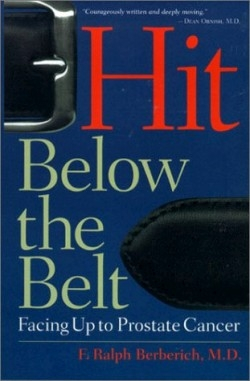Hit Below the Belt
Facing Up to Prostate Cancer
I became a cancer case on July 31, 1998. That was the day I walked into the MRI room, having been assigned a medical record number. I emerged seemingly unchanged, not knowing that cancer would be discovered, that I would be the bearer of a diagnosis, precipitously cast into a pool of like-fated individuals destined to share common paths.
So begins this remarkable book, an expertly woven memoir and informational text written by a pediatric oncologist who was diagnosed with prostate cancer at a relatively young age. Although it is full of basic information regarding the cancer and its treatment options, it is never boring or pedantic. Berberich’s honesty and writing skills are such that the book is actually entertaining in a morbid sort of way. What he has attempted to do is provide the reader with his story, that of the cancer patient: how he reacted, his emotions, the lengths he personally went to to avoid surgery, and a deliberate attempt to describe how certain procedures and side effects felt in a way that the reader can understand.
He also has declined the use of euphemisms for anatomical organs, and settled for the straightforward use of penis, rectum, prostate, and bladder, among others, explaining that these taboos too easily confuse what he’s trying to say. He is just as honest about how hormone therapy and prostate procedures effect sexual drive and sexual activity. Never crude or coarse, he is nonetheless refreshingly direct. Because Berberich is a physician, he took refuge in research. Lots and lots of research, to the extent that it became, not only to him, but to his friends and family, a way to avoid actually beginning treatment. He honestly—and bluntly—discusses why he tried to avoid surgery, fully aware that he was not completely rational in this. Berberich shares his quirks, his neuroses, and his fears.
After his research, his seemingly endless searches for “second opinions,” after finally picking his therapy, completing it, and having some severe side effects, he says, “I was not myself from the moment of diagnosis to the present and have had to painstakingly crawl back toward a remembered normalcy. I may never be quite the person I was before all of this began.” Neither will the reader.
Reviewed by
Mark Terry
Disclosure: This article is not an endorsement, but a review. The publisher of this book provided free copies of the book to have their book reviewed by a professional reviewer. No fee was paid by the publisher for this review. Foreword Reviews only recommends books that we love. Foreword Magazine, Inc. is disclosing this in accordance with the Federal Trade Commission’s 16 CFR, Part 255.

